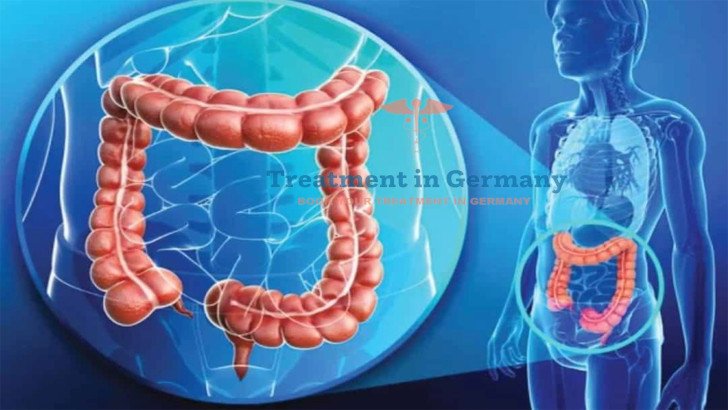
Colon cancer (ICD C18) is one of the five most common malignant tumors in the world, ranking third overall. While the average age of most patients is 60-75 years, the disease can also develop in individuals between 35-50 years old.
Colorectal cancer, a malignancy affecting the colon or rectum, remains a significant global health concern, but the landscape of cancer treatment innovations is evolving rapidly. In 2025, Germany stands as a beacon of progress in advanced colorectal cancer care, offering groundbreaking therapeutic advancements that transform outcomes for colorectal cancer patients. Renowned for its medical excellence, Germany attracts patients worldwide.
Colorectal cancer arises from the lining of the colon or rectum, often beginning as benign polyps that can become cancerous. Risk factors include obesity, smoking, diets rich in processed foods, and genetic conditions like Lynch syndrome or familial adenomatous polyposis (FAP). Early-stage colorectal cancer is highly treatable, but advanced stages (III or IV) pose challenges due to metastasis to organs like the liver or lungs. Germany’s oncology centers and hospitals lead in advanced colorectal cancer care, integrating precision medicine, immunotherapy, and surgical innovations to achieve superior survival outcomes.
Early identification of colorectal cancer symptoms is critical for effective intervention. Key signs include:
These symptoms may mimic benign conditions, emphasizing the need for advanced diagnosis. German specialists employ cutting-edge tools to ensure timely detection, enhancing treatment outcomes.
Pioneering Diagnostic Breakthroughs for Colorectal Cancer
Accurate diagnosis underpins successful colorectal cancer treatment. In 2025, Germany’s hospitals leverage innovative diagnostic breakthroughs to confirm colorectal cancer and tailor cancer treatment innovations:
German radiologists and pathologists deliver precise diagnostic breakthroughs, enabling customized standards of care for colorectal cancer patients.
Germany’s Therapeutic Advancements in Colorectal Cancer Treatment for 2025
Germany’s advanced colorectal cancer care ecosystem is at the forefront of therapeutic advancements, offering a multidisciplinary approach to tackle colorectal cancer, especially in advanced stages. Oncology centers integrate established and novel therapies to optimize survival outcomes.
Surgical Innovations for Colorectal Cancer
Surgery remains the gold standard for respectable colorectal cancer. German surgeons utilize advanced techniques, including:
These surgical innovations, supported by real-time navigation, improve anti-tumor efficacy for colorectal cancer patients.
Systemic Therapies: Chemotherapy and Precision Medicine
For advanced or metastatic colorectal cancer, Germany offers cutting-edge systemic cancer treatment innovations:
German oncologists tailor these therapies, maximizing therapeutic advancements for colorectal cancer patients.
Immunotherapy: A Transformative Approach
In 2025, immunotherapy is revolutionizing colorectal cancer treatment, particularly for microsatellite instability-high (MSI-H) or mismatch repair-deficient (dMMR) tumors:
German immunologists advance immunotherapy through clinical trials, providing hope for resistant cases.
Leading Clinical Trials in 2025
Germany’s prominence in clinical trials for colorectal cancer offers access to pioneering therapeutic advancements, often unavailable elsewhere. Trials in 2025 explore:
German oncology centers lead global research, driving advanced colorectal cancer care.
Why Germany Excels in Colorectal Cancer Treatment
Germany offers unmatched advantages for colorectal cancer patients seeking advanced colorectal cancer care:
Risk Factors and Prevention Strategies for Colorectal Cancer
Preventing colorectal cancer complements therapeutic advancements. Key risk factors include:
German specialists promote regular screenings (colonoscopy, stool DNA tests), healthy diets, and exercise to reduce disease risk.
Comprehensive Multidisciplinary Cancer Care
Germany’s multidisciplinary cancer care ensures holistic treatment for colorectal cancer:
This collaborative approach, led by German surgeons and oncologists, optimizes colorectal cancer treatment outcomes.
Post-Treatment Care and Enhancing Quality of Life
After colorectal cancer treatment, German oncology centers provide comprehensive follow-up:
Germany’s patient-focused approach ensures colorectal cancer patients achieve sustained recovery.
Challenges and Future Horizons
Colorectal cancer treatment faces obstacles, including late diagnosis and therapy resistance. German researchers address these through:
By 2025, innovations like universal immunotherapy platforms and personalized vaccines promise to expand cancer treatment innovations.
Conclusion
In 2025, Germany’s latest advancements in colorectal cancer treatment are reshaping care for colorectal cancer patients, offering hope through advanced colorectal cancer care. By integrating precision medicine, immunotherapy, and clinical trials, German oncology centers deliver tailored, transformative therapeutic advancements. Supported by world-class specialists and cutting-edge technology, Germany ensures exceptional survival outcomes and quality of life. As a global leader in cancer treatment innovations, Germany provides a lifeline for colorectal cancer patients, blending scientific breakthroughs with compassionate care.
Frequently Asked Questions
What are the latest advancements in colorectal cancer treatment in Germany for 2025?
They include multidisciplinary cancer care with surgical innovations, precision medicine, and immunotherapy, offered at German oncology centers.
What are common colorectal cancer symptoms?
Symptoms include blood in stool, abdominal discomfort, weight loss, and fatigue, requiring prompt diagnosis.
How is colorectal cancer diagnosed in Germany?
Through AI-driven colonoscopy, CT scans, liquid biopsies, and molecular profiling at German hospitals.
Are clinical trials for colorectal cancer available in Germany in 2025?
Yes, German oncology centers explore immunotherapies and gene therapies.
Is follow-up care provided after colorectal cancer treatment in Germany?
Yes, including MRI, rehabilitation, and emotional wellness support.
How does Germany compare to the UK/US for colorectal cancer treatment?
Germany leads in therapeutic advancements, faster access, and holistic care.
Can colorectal cancer treatment prevent recurrence?
Precision medicine and immunotherapy reduce recurrence risk by targeting residual cancer cells.
Does Germany support international colorectal cancer patients?
Hospitals in Germany offer language assistance, travel coordination, and emotional wellness programs.
What are the latest innovations in colorectal cancer treatment in Germany for 2025?
Germany pioneers AI-driven diagnostics, immunotherapy platforms, and gene editing.
How does colorectal cancer treatment differ from standard chemotherapy?
Unlike chemotherapy, precision medicine and immunotherapy deliver targeted anti-tumor efficacy with fewer side effects, enhancing quality of life.
For more information or a free consultation, visit our contact us page.
Kindly complete the form below, and our dedicated team will reach out to you promptly. We look forward to connecting with you soon!
Trierer Straße, 56072 Koblenz, Germany

.webp)
 (1).webp)

.webp)
 (1).webp)


.webp)
 (1).webp)

.webp)
 (1).webp)
